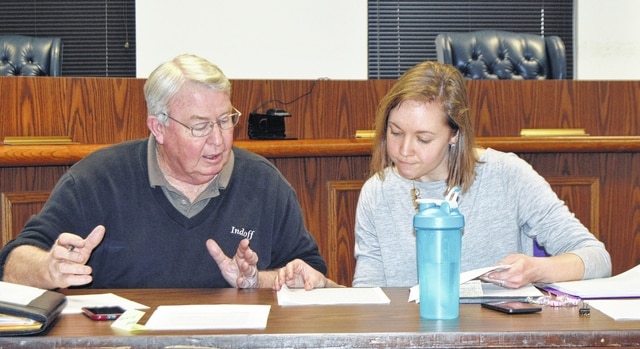
WILMINGTON — Wilmington Council’s water committee met Thursday to discuss water fluoridation, the practice of billing landlords for their tenants’ delinquent bills and a $46,000 water fund appropriation for equipment.
Committee chair Kelsey Swindler said she compared Wilmington’s ordinance to the Ohio Revised Code and local ordinances for Columbus, Cincinnati, Washington Court House, Lebanon and Hillsboro.
Swindler said Columbus, Cincinnati and Washington Court House bill the landlord for delinquent utilities, but Hillsboro and Lebanon employ a deposit system instead.
At a previous water committee meeting, several landlords requested relief from the practice, arguing that the city is in a better position to manage it. Some said it costs them thousands of dollars a year.
“Whenever we get a tenant move out, we usually get stuck with a water bill,” said Cheyenne Duggins at that March 8 meeting. “A few of the other landlords, we don’t think it’s fair we have to pay for the water bill we didn’t get to use.”
Duggins later said it takes too long to get a tenant’s water shut off to avoid the bill, too.
Lebanon, Swindler said, uses a collections company and charges $25 for a deposit.
“In my review, we are not at all out of step with the Ohio Revised Code,” Swindler said, adding that the ORC limits what a city can charge for a deposit to what appears to be about one month’s estimated charge. The ORC also says interest must be paid back to the depositor.
At a March 8 water committee meeting, Wilmington Utility Billing Department Supervisor Barb McVey told the committee March 8 that a deposit of $200 would be needed to protect the city.
“It doesn’t make as much sense for a city to charge a deposit as it does a private business because we’re under the kind of strictures that make it very difficult to do so,” Swindler said. “Our ordinance as it stands is consistent with state law and I think it’s perfectly appropriate.”
“We could not really collect anything in the neighborhood of the kind of money that the landlords were hoping for,” said council member Mark McKay. “It would be kind of fruitless to go down that pathway, sounds like.”
Wilmington Law Director Brett Rudduck suggested landlords should charge the deposit themselves.
Council member Loren Stuckert agreed with Rudduck.
Wilmington resident Paul Hunter said council’s responsibility is to all of the city’s residents, not one particular section or business.
“If an investor makes a faulty risk assessment, should the result of that business decision impact other residents?” Hunter asked. “If enough defaulted water bills go unpaid, revenue falls, water rates have to be increased. The rate increase will have to be applied to all consumers.”
Hunter said that would create a situation where homeowners are subsidizing landlords.
Swindler and Rudduck said there is a local ordinance that allows the city to take a deposit at any time, rather than at the beginning of the service period. Swindler said that ordinance violates state laws and needs to be amended immediately.
The committee held no vote and will continue to review the ordinances.
The committee also:
• On fluoridation, Swindler said Middletown projected annual chemical costs of $8,000 a year, lower than Wilmington’s initial projections of $18,000 annually. Swindler said she would research the costs further.
• The committee also heard from Dr. Shawn Swick, who said the studies showing negative effects of fluoride weren’t at all related to what the water plant would do. Clinton County Health Commissioner Pam Bauer also supported fluoridating the water, saying, “For pennies, you can do a lot of prevention.” The committee is considering a public forum to discuss the possibility of fluoridating water.
• Will recommend to finance committee to approve a supplemental appropriation of $46,000 from the water fund to pay for a hydro-excavator.
Reach Nathan Kraatz at 937-382-2574, ext. 2510 or on Twitter @NathanKraatz.


